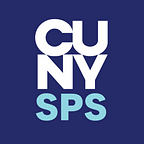Introducing the CUNY SPS EDI Ambassadors (Pt. 2)
Members of our first cohort of EDI Ambassadors discuss how they are making their work and classrooms more inclusive.
Since its inception in Fall 2019, the Committee on Institutional Equity and Diversity (CIED) has utilized workshops and specialized training sessions to foster a culture of diversity, equity, and inclusion (EDI) at CUNY SPS.
The CIED recently recognized a cohort of faculty and staff who had committed themselves to an intensive EDI training regimen through LinkedIn Learning. Those who completed the multiple training modules were distinguished as “EDI Ambassadors” by the CIED and earned a special certification badge.
We got in touch with the EDI Ambassadors to ask how they planned to apply their newly acquired strategies to advance an inclusive campus culture. In part two of this four-part series, we chatted with EDI Ambassadors Trevaughn Bynum-Ortiz, the academic program specialist for the online Business programs, Rinchen (Rin) Lama, human resources coordinator, and Jan Oosting, assistant professor, Nursing programs. Each of these faculty and staff members completed their EDI coursework in Spring 2023.
The CUNY SPS community is so diverse. How did the LinkedIn Learning courses help you to better appreciate the perspectives of colleagues with different backgrounds?
Trevaughn Bynum-Ortiz: “I have always appreciated our diverse community at SPS. Now, I have more tools available to communicate my appreciation.”
Jan Oosting: “I completed the courses precisely because of the diversity of our community. As a white cisgender person, I feel that it is of extra importance for me to do the work to begin to learn the perspectives and lived experiences of my colleagues and students. Workforce and community conversations around issues of DEI are difficult at times, but essential for building a community where everyone truly feels a sense of belonging.”
Have you incorporated any EDI practices you learned into your work or unit at CUNY SPS? If so, how/what?
Rin Lama: “I’ve incorporated listening to my colleagues first before making any assumptions about different perspectives.”
Jan Oosting: “Among other ongoing efforts, I have piloted translanguaging in one course this spring, which empowers students to complete assignments in their language of choice.”
Trevaughn Bynum-Ortiz: “I have learned how to gently correct less-than-EDI moments and be more effective with leading people to more inclusive language and thought processes. I find myself in curiosity mode a lot and asking, ‘Why do you think that?’ So far, people have been receptive to really thinking about what they are saying.”
What was your favorite takeaway from the series? Did the series inspire any new goals?
Bynum-Ortiz: “My favorite takeaway was how we are simultaneously part of the problem and solution to creating an inclusive culture within our organization.”
Oosting: “My favorite takeaway was that we must always keep learning, even if we make a mistake. It’s best to acknowledge the mistake and take corrective action for next time!”
Did the series inspire any new goals?
Oosting: “The series inspired me to continue to encourage my SPS colleagues to also take the series of courses, so that we can have these conversations on a much more nuanced level.”
Bynum-Ortiz: “Maybe to keep imagining a world where EDI trainings are not necessary.”
Now that you’ve completed the LinkedIn Learning series, how would you advocate for EDI structures and principles to colleagues who may not recognize its importance?
Bynum-Ortiz: “Because the SPS community is so diverse, the Linked In courses are important to point out the concept of hidden biases. I think the most profound conversations were when people were realizing the way they thought about something revealed bias they did not realize they were having. The more we think about it and consider others around us, the stronger we will be as a group.”
Lama: “The series inspired me to read more critical race theory books in the summer!”
Oosting: “I think that sometimes people think of DEI as a ‘side’ concept, when really it is central to every action that we take. Our lives are complex, our identities are complex, and each of us deserves to be able to come to work and be our most comfortable selves. That’s true for students and staff/faculty alike.”
The LinkedIn Learning EDI series represents a significant time commitment and everyone has such busy schedules. Would you like to share tips on how you managed your time while working through the LinkedIn Learning series?
Lama: “I would suggest watching the videos if there is downtime during the work day or to watch them as the last thing before ending the work day.”
Oosting: “I added it to my to-do list and just tried to stay on top of it like any other meeting. The conversations after the trainings were helpful for me so that it did not get put off or forgotten in the mix of a demanding schedule.”
Bynum-Ortiz: “I just did a little at a time in between the many nooks and crannies of my job. Mostly, I did them in the morning to get into the day so to speak.”
Anything else you would like to add?
Bynum-Ortiz: “I believe the trick to practicing EDI is treating each individual as an individual.”
Learn more about the CIED’s mission and programs here.
